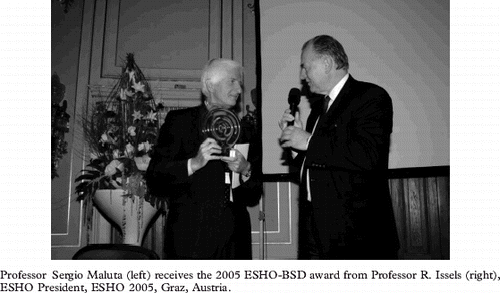From 1999, the European Society of Hyperthermic Oncology (ESHO) presents yearly the ESHO-BSD award to one of their members with special merits for the application of hyperthermia in cancer therapy. The winner is awarded with a specially designed trophy resembling a wave character of electromagnetic heating and with a cheque sponsored by the BSD Corporation.
The previous winners are: 2004, Peter Vaupel; 2003, Jan J. W. Lagendijk; 2002, Rolf Issels; 2001, Dionisio Gonzalez Gonzalez; 2000, Peter Wust; 1999, Cobi van der Zee.
The 2005 ESHO-Award was given to Professor Sergio Maluta at the ESHO 2005 annual meeting in Graz, Austria.
Curriculum vitae of Sergio Maluta
Professor Sergio Maluta graduated in Medicine from Padua University, Italy in 1972. Thereafter, he underwent his training in radiology and radiotherapy, in oncology and gynecology, achieving the specialization in Radiology, Radiotherapy, Oncology and Gynecology (1982) at the University of Padua. From 1976–1989, he served as a Professor at the Padua University and became Head of the Radiotherapy Department and the Oncological Unit of S. Chiara Hospital of Trento from 1989–1994. In 1994, he left Trento to take up the Professorship and Head of Radiotherapy Department and Oncological Unit of SS. Giovanni e Paolo Hospital of Venice. In 1997, he assumed his present position as Professor and Head of Radiotherapy Department of University-Hospital of Verona. He is currently professor at the University of Verona for the Radiology, Gynecology, Anesthesia (Antalgic Therapy), Pediatrics specialities. He has also served as a professor at the Radiotherapy speciality of Faculty of Medicine of Modena University.
Over the last 30 years, Professor Maluta collected wide experience in the management of cancer patients. In particular, his main interests in oncology varied in several applications of radiotherapy from brachytherapy in lung cancer, oesophageal cancer, gynecological cancer as well as stereotactic radiosurgery (Gamma-Knife) in meningioma, neurinoma and brain metastases. Another area of interest is bone marrow transplantation (total body irradiation) for haematological malignancies such as lymphomas and leukaemia.
Beside his extensive experience in the management of several tumour entities with radiotherapy, Professor Maluta also has a great interest in the clinical application of hyperthermia. For several years he focused on superficial hyperthermia combined with radiotherapy ± chemotherapy in pathological neck nodes, breast recurrences, recurrences in pre-irradiated area and skin tumours (melanoma). Additionally, he focused on deep hyperthermia combined with radiotherapy ± chemotherapy for gynecological tumours, advanced rectal cancer, high risk prostate cancer, retroperitoneal sarcomas, recurrences in pre-irradiated area as well as deep hyperthermia combined with chemotherapy for liver metastases from colorectal cancer. Beside his dedication and large experience into the clinical management with hyperthermia and radiotherapy, Professor Maluta was involved and initiating several clinical studies with hyperthermia. In particular, he focused on the effects of liposome with taxane combined with hyperthermia running phase I studies with collaboration of National Centre of Researches (CNR), Casaccia-Rome, and several other studies with deep hyperthermia combined with chemotherapy in liver metastases treatment as well as in colorectal cancer.
He is author of more than 180 well-cited articles ranging from brachytherapy, radiosurgery to combination treatment of radiotherapy and chemotherapy and over more than 15 years on hyperthermia. He has published and has presented at international oncological meetings several phase II studies in colorectal cancer, lung cancer and brain tumours with hyperthermia, from the palliative setting up to neoadjuvant treatments, presenting innovative studies and concepts.
He serves in an advisory capacity to many national and international science foundations and is currently a member of several radiotherapy societies. In 2002, he was elected as a board member of the European Society of Hyperthermic Oncology (ESHO) and in 2003 as a leader participant in the Network of Excellence (NoE) EUROTHERM (www.eurotherm-network.org). In 2004, he was elected as a member of the Editorial Board of International Journal of Hyperthermia and as a member of Consensus Group in Hyperthermia at Kadota Forum (Osaka, June 2004). In 2005, he founded the Italian Study Group of Hyperthermia of A.I.R.O (Italian Association of Radiation Oncology) with strong interest in hyperthermia.
Professor Maluta has made a valuable contribution to our knowledge in clinical hyperthermia in combination with radiotherapy and hyperthermia in solid tumours, has developed and suggested new innovative studies and has surprised us with pioneering ideas. We are grateful to Professor Maluta for his dedication and contribution.